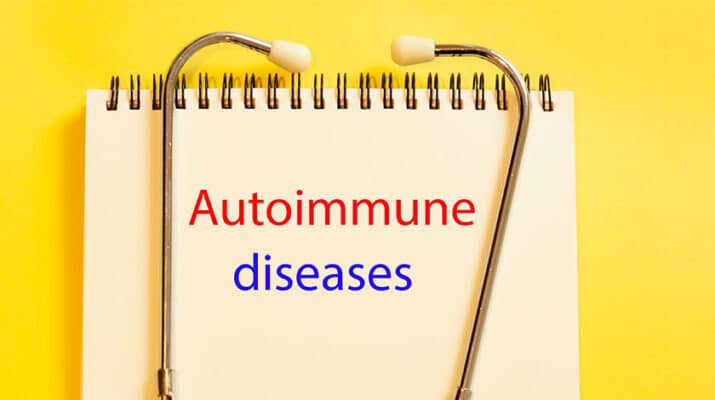By Deborah Jeanne Sergeant

About 80 autoimmune disorders exist, depending upon how these conditions are classified.
Although affecting different areas and systems of the body, this group of disorders possess a few similarities.
Some share a few core symptoms, such as fatigue, body aches, fever, swelling, difficulty in focusing, weight fluctuation, and skin changes.
Most autoimmune conditions present with other specific issues. Some inexplicably go into remission and flare up later, but in most cases are lifelong upon onset. Medical care and good self-care can usually make living with an autoimmune condition much more comfortable. No cures exist for autoimmune conditions.
“The effects of having an autoimmune disease extend beyond the physical symptoms, as depression and anxiety frequently co-exist with autoimmune disease,” said Molly Murray, president and CEO of the Autoimmune Association in Clinton Township, Michigan. “Autoimmune patients can feel stressed from navigating healthcare coverage and treatments, having to go to frequent medical appointments, and trying to balance their condition with other life responsibilities. They can feel isolated and misunderstood and can grieve the lifestyle they had before their diagnosis. Autoimmune patients should know they are not alone. Mental health providers can provide coping tools and we encourage everyone to share their stories and connect with other patients.”
Some autoimmune conditions are “invisible” and can be minimized by outsiders. Crohn’s disease and colitis cause diarrhea, urgency, abdominal pain/cramping, bloody stool, fatigue and weight loss and “it is not just ‘tummy pain’ or diarrhea,” said Becky Johnson Rescola, vice president of Education and Community Engagement at the Crohn’s & Colitis Foundation in New York City. “Many people don’t understand the fatigue, chronic pain, and day-to-day accommodations that are part of coping with these diseases.”
The organization operates a chapter in Rochester that serves all of Western and Central New York.
Celiac disease is another example of an autoimmune condition. Joanne Hameister, a retiree in East Aurora, was diagnosed in 1985. She founded WNY Gluten Free Diet Support Group (www.glutenfreeinwny.com).
“I had all the symptoms 30 years,” Hameister said.
These include abdominal cramping, amenorrhea (absence of menstruation), anemia, bloating and distention, brain fog and inability to concentrate, canker sores, constipation, dental abnormalities, diarrhea, edema and swelling, electrolyte imbalance, fatigue, headaches, pain in bones and joints, vitamin and mineral deficiencies, vomiting and weight loss or gain. Celiac disease damages the villi in the small intestine whenever gluten is consumed. Gluten is a protein naturally occurring in wheat and rye that is harmless to most people.
She tried eight gastroenterologists, one of whom accused her of being a hypochondriac and sent her to a psychiatrist. A biopsy—not the current blood test—finally uncovered the truth when she was in the hospital on an IV after a 40-pound weight loss.
“My doctor said, ‘I have good news and bad news. The good news is, we know what you have, celiac disease. The bad news is, I have no idea what that is,’” she said.
A dietitian helped her better understand how she could avoid foods with gluten and how that affects her health.
At first, eating out and finding safe foods was very difficult, as few people understood how sensitive Hameister is to gluten. For example, using the same utensils for foods containing gluten and her gluten-free goods can cause contamination. Even while taking this level of precaution, she lost all the villi in her small intestine in 1992 and nearly died. For a year, she had to receive IV nutrition.
She said that for a time, she felt like her body betrayed her by not doing what it should. Initially, she was treated like a “fussy eater” because she could tell what foods tended to bother her. For years as a young adult, she kept three sizes of clothing in her closet—4, 6, and 8—for her fluctuating weight.
“I’m so used to it now,” she said. “You have to be careful. Right now, my whole kitchen, except dog food, is gluten-free.”
By eliminating gluten from her diet, she can control her condition.
“I feel pretty good now,” Hameister said.
Common Autoimmune Disorders
• Rheumatoid arthritis, in which the immune system destroys the joints, followed by the organs.
• Psoriasis/psoriatic arthritis causes skin cells to build up and form inflamed scales on the skin. About one-third of people with psoriasis also have psoriatic arthritis.
• Multiple sclerosis attacks the myelin sheath which surrounds the central nervous system’s nerve cells, slowing impulses from the brain to the body, resulting in difficulty in movement.
• Systemic lupus erythematosus causes joint pain, severe body fatigue and skin rashes.
• Inflammatory bowel diseases include Crohn’s disease, inflaming any portion of the GI tract and ulcerative colitis, which affects the colon and rectum.
• Addison’s disease affects the how much hormones the adrenal glands produce, which regulates how the body uses and stores carbohydrates and regulates sodium in the bloodstream.
• Although in different ways, Graves’ disease and Hashimoto’s thyroiditis affect the thyroid, a gland important for controlling the metabolism.
• Sjögren’s syndrome attacks the glands that produce saliva and tears, meaning the patient experiences dry eyes and a dry mouth.
• Celiac disease causes the immune system to attack and inflame the small intestine whenever the patient eats foods containing gluten, a naturally occurring protein in wheat and rye. Gluten is not harmful to people without celiac disease or sensitivity. Gluten sensitivity is not an autoimmune disease.

